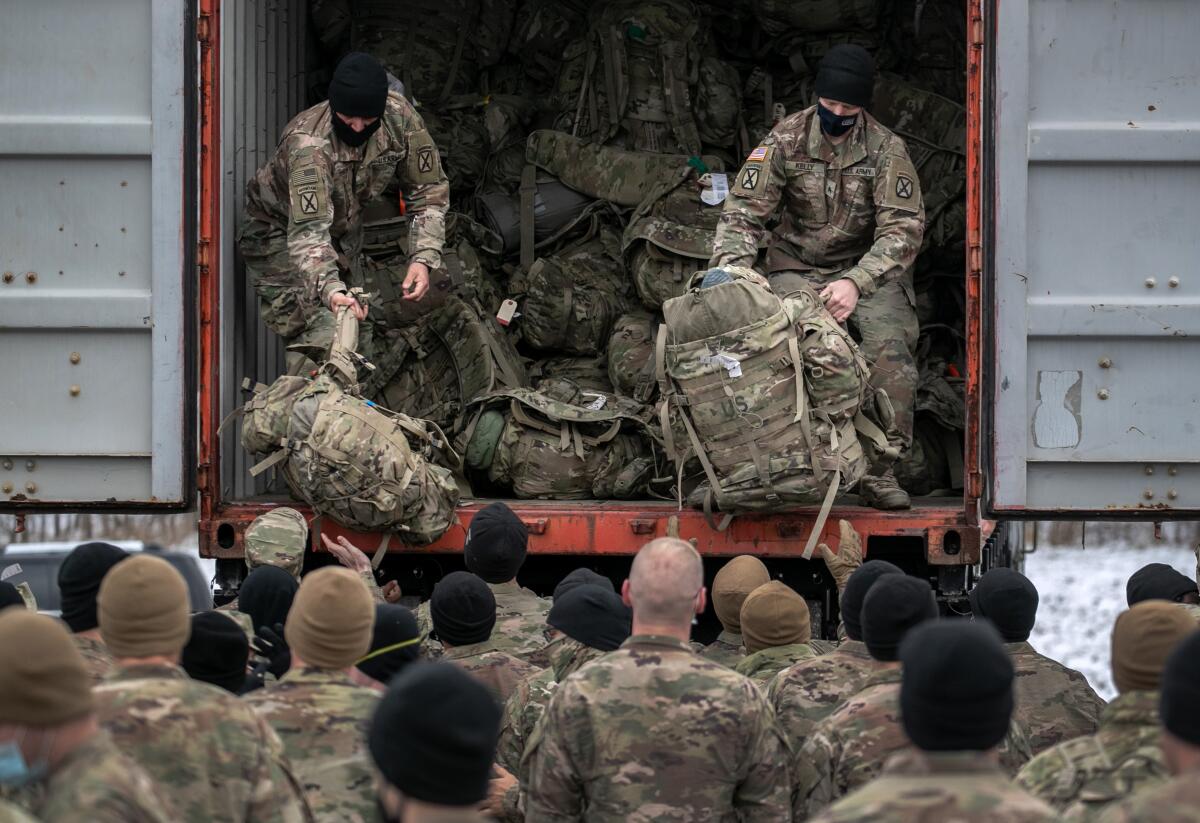Op-Ed: Why the risks of a U.S. withdrawal from Afghanistan outweigh the benefits

President Biden’s decision to withdraw all remaining U.S. troops from Afghanistan represents a major shift in U.S. counter-terrorism strategy. The withdrawal is calendar-based rather than conditions-based, which means the U.S. is withdrawing from Afghanistan not because conditions on the ground are conducive to peace and stability but because the war is unpopular domestically — and because Biden believes that the conflict with the Taliban is ultimately unwinnable.
But the risks of a U.S. withdrawal outweigh the benefits of leaving.
As the annual threat assessment released this week by the U.S. intelligence community lays out, Al Qaeda remains among “the greatest Sunni terrorist threats” and continues to “seek to conduct attacks inside the United States.” Islamic State also maintains a presence in Afghanistan. Last April, a cell of jihadists was arrested in Germany on suspicion of planning to attack U.S. and NATO bases in that country — a cell that was being instructed by an Islamic State operative based in Afghanistan.
Once the U.S. withdraws from Afghanistan, the Taliban is likely to take control of large swaths of the country by force. This will lead to renewed repression of the Afghan population, with the Taliban reverting to draconian Islamic rule in the areas it controls. But given the Taliban’s long-standing ties to Al Qaeda, Afghanistan will also once again become a country where transnational terrorist organizations can organize as they plot to strike the West.
By contrast, the cost of keeping roughly 3,000 U.S. troops in Afghanistan to work with Afghan forces pales in comparison. There have been no U.S. combat deaths since February 2020. In his speech laying out the reasoning behind his decision, Biden suggested that the U.S. had accomplished its goals in Afghanistan by killing Al Qaeda’s longtime leader, Osama bin Laden, a decade ago and dismantling the terrorist organization he headed.
President Biden is slated to announce the withdrawal of U.S. troops from Afghanistan by Sept. 11, ending two decades of military involvement.
There is no question that Al Qaeda has been degraded following nearly two decades of Western counter-terrorism operations. Al Qaeda’s current leader, Ayman Zawahiri, remains in hiding and surfaces periodically only to issue official statements. Rumors of his death have persisted online, and Zawahiri hasn’t been heard from in months, further lending credence to reports of his demise.
But a degraded Al Qaeda is not a defeated Al Qaeda. With a U.S. withdrawal from Afghanistan and the potential for a Taliban takeover of the country, the terrorist organization might have the opportunity to rebuild its network to the point where it could once again launch spectacular attacks on Western soil. Without a presence on the ground in Afghanistan, the U.S. is going to find it extremely difficult to monitor and disrupt emerging terrorist threats.
Yet the Biden administration, after undertaking what it called a “rigorous” policy review, ultimately decided that it was possible to mitigate terrorist threats emanating from Afghanistan even without U.S. troops on the ground.
Under the terms of the withdrawal, the U.S. government has pledged to “hold the Taliban to its commitment to ensure Al Qaeda doesn’t threaten” the U.S. and allied interests. But the Taliban never actually broke with Al Qaeda, refusing to condemn the jihadists and even celebrating Al Qaeda attacks in its own propaganda.
If Afghanistan descends into civil war after the departure of U.S. troops, and the Afghan security forces are unable to hold off Taliban insurgents, as many predict, the result will be a failed state in the heart of South Asia that once again has the potential to grow into a magnet for jihadists throughout the region. Without U.S. and allied troops in Afghanistan, intelligence analysis must occur from afar. This will hurt counter-terrorism operations and the ability to conduct surveillance and reconnaissance against high-ranking terrorist leaders. Intelligence collection will inevitably suffer, too.
The announcement that the United States would withdraw all of its troops from Afghanistan by Sept. 11 also, inadvertently, hands a symbolic victory to the Taliban and Al Qaeda. The result is a monumental public relations triumph for the Taliban and its jihadist allies, one that is sure to be featured in propaganda that celebrates the Taliban prevailing over what it has long dubbed the “crusader occupation.” Choosing 9/11 as the date of withdrawal plays into the jihadi narrative of an oppressive Western alliance intent on going to war with Islam. It is a rare unforced error on the part of the Biden administration that could have been avoided.
In wanting to bring an end to America’s longest war, Biden enjoys the support of many Americans who are war-weary and skeptical of Afghanistan’s importance to U.S. national security. But if the Taliban and Al Qaeda are hoisting the black flag of jihad over Kabul this fall on the 20th anniversary of the Sept. 11 attacks, it will be an excruciating reminder of everything the U.S. has lost in Afghanistan and how little it has gained.
Colin P. Clarke is the director of policy and research at the Soufan Group, a global intelligence and security consultancy based in New York City.
More to Read
A cure for the common opinion
Get thought-provoking perspectives with our weekly newsletter.
You may occasionally receive promotional content from the Los Angeles Times.











